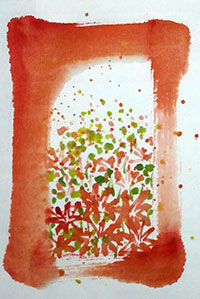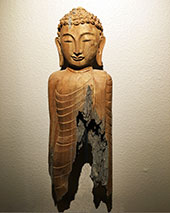Sanctuary - video by Jack Kornfield [19 min]
The Driverless Bus - excerpt from an Ajahn Brahm talk
The Empty Rowboat - excerpt from "Everyday Zen" by Joko Beck
In Buddhist philosophy there are three characteristics of life, often called the "Three Marks of Existence", that are held to be universally true. The first is Dukkha or Suffering, meaning that life is difficult, or at least, that no-one gets through life without some suffering. The second is Anicca or Impermanence, meaning that everything is subject to change, nothing lasts forever. It's easy to see the truth of these first two, but the third mark, Anatta, often referred to as "No-Self" is not so easy to understand. One way of understanding it is that all the things we think of as our "self" (our body, our thoughts, our identity, things we think of as being "I", "me" or "mine"), are not lasting and in constant flux, and therefore in that sense, insubstantial.
Yet, at the same time, in Buddhist philosophy there is something called "Buddha-nature", which is common to all of us, always present and more expansive, more inclusive than any fixed concept of "self". In the video, above, Sanctuary, Jack Kornfield says, "it's important to remember your Buddha-nature and your zip code", that is, what we have in common with all beings and our individual identities.
Included above are two teachings, The Driverless Bus and The Empty Rowboat, providing vivid metaphors about "the illusion of self".
The [third] mark of existence is egolessness, sometimes called no-self. These words can be misleading. They don’t mean that we disappear – or that we erase our personality. Egolessness means that the fixed idea that we have about ourselves as solid and separate from each other is painfully limiting. That we take ourselves so seriously, that we are so absurdly important in our own minds, is a problem. Self-importance is like a prison for us, limiting us to the world of our likes and dislikes. We end up bored to death with ourselves and our world. We end up very dissatisfied…
In the most ordinary terms, egolessness is a flexible identity. It manifests as inquisitiveness, as adaptability, as humor, as playfulness. It is our capacity to relax with not knowing, not figuring everything out, with not being at all sure about who we are, or anyone else is, either. Every moment is unique, unknown, completely fresh. For a warrior-in-training, egolessness is a cause of joy rather than a cause of fear.
- from Comfortable with Uncertainty: 108 Teachings by Pema Chodron
There is a famous Ojibwa Indian saying, "Sometimes I go about pitying myself, when all the while I’m being carried by great winds across the sky." There is a vastness to life unfolding, and we are a part of it. We’re not separate from it. When we feel this, we know that we too will be carried through periods of difficulty and ease, grief and joy, loss and success, and that we’re part of something so much larger.
- from Patience is the Wrong Word by Jack Kornfield
We are constantly changing; everything is changing, and as long as we live, we are just as we are. So we ask, what are we? What is our unchanging essence? What we think we are, unfortunately, is not what we are, or at most only a very small portion of it. A large amount can't be contained in a small container. Our life is like an iceberg; we can consciously perceive only a small portion of it. The larger portion is under water. If we try to understand our life using our limited knowledge, understanding is impossible. What is our life? As Buddha and all the masters tell us, it's altogether one life. Even saying "one" sounds silly. Since everything is nothing but your life, it's quite all right that some things are big and some are small, some are high and some are low, some are dark, and some are light. But since we find it difficult to accept things as they are, we have to practice, and the struggle begins.
- from Nothing Special: Living Zen by Charlotte Joko Beck
The moment you have an individual, you have separation, and the moment you have separation you have the longing to end that separation, to heal the divide, to come home. It's the wave longing to return to the ocean. And of course on some level the wave knows that it was never for one moment separate from the ocean - that the sense of being a wave is merely a temporary contraction of the whole.
The little wave is inherently a seeker, and he runs around the world like a headless chicken, trying to find something which of course he never lost in the first place. And he never lost this because he never had it. He always was it. The wave was always, always, a perfect expression of that which cannot be expressed. You - the character, the person, the individual - were always the divine expression, expressing itself perfectly, completely, and exhausting itself in that expression, leaving no trace, no residue.
- from An Extraordinary Absence: Liberation in the Midst of a Very Ordinary Life by Jeff Foster
At some time in your life, you've probably had the experience of falling in love. Suddenly, in the presence of another person (or a work of art, a flower, a piece of music, a sunset - you can fall in love in all sorts of ways), there is simply wonder, fascination, awe. Past and future fall away, the illusion of time collapses, and there is only what is - and it's an unspeakable miracle. You really see who and what is in front of you. It feels like you've finally found what you were looking for. What you were always seeking is right here in front of you. It feels like coming home, as if something in you has eventually come to rest.
...Love is as good a word as any for what remains when the separation between us and others dissolves. Love points to the intimacy at the heart of present experience, an intimacy that is always there, but so rarely noticed.
- from The Deepest Acceptance: Radical Awakening in Ordinary Life by Jeff Foster
We don't want to see ourselves as simply a temporary formation, a whirlpool in the river of life. The fact is, we take form for a while; then when conditions are appropriate, we fade out. There's nothing wrong with fading out; it's a natural part of the process. However, we want to think that this little whirlpool that we are isn't part of the stream. We want to see ourselves as permanent and stable. Our whole energy goes into trying to protect our supposed separateness. To protect the separateness, we set up artificial, fixed boundaries; as a consequence, we accumulate excess baggage, stuff that slips into our whirlpool and can't flow out again. So things clog up our whirlpool and the process gets messy. The stream needs to flow naturally and freely... We serve other whirlpools best if the water that enters ours is free to rush through and move on easily and quickly to whatever else needs to be stirred. The energy of life seeks rapid transformation. If we can see life this way and not cling to anything, life simply comes and goes.
- from Nothing Special: Living Zen by Charlotte Joko Beck
Ruwinie (from Jamaica) suggested The Driverless Bus by Ajahn Brahm, above, for this month's meeting.
Freddy (from Spain) suggested the excerpt from Jack Kornfield's Patience is the Wrong Word, above.
from Ann (Colorado):
The painful emotions that live inside of us, just live inside of us. They are not us. If we “see” them as separate entities, just living inside of us, they develop a space around them. They then no longer control our thinking..
- Eckhart Tolle, A New Earth
from Christina (Hong Kong) - art by Christina:

Four Seasons
宋 無門慧開禪師
Monk Wumen Huikai, Song Dynasty
春有百花秋有月,
With the Autumn moon, hundreds of Spring flowers.
夏有涼風冬有雪。
The Winter snow and breezy Summer air.
若無閒事掛心頭,
If in your heart there’s not a single worry,
便是人間好時節。
Any season will be the finest hours.
from, and by, Amanda (England):
I feel that the 'self' part of me becomes more apparent when I enter a state of no-self or a lack of self – it feels totally different. For me, when I am fully in the present moment, connected to something bigger, universal and pure such as nature, I feel a freedom. Freedom from the confines and stereotypes I have created for my 'self'. When present and experiencing no-self, I am non-judgmental, accepting of things just as they are and let go of any attachments I may have had. If the 'self' incorporates the ego, no wonder it feels very freeing to let go of it and feel child-like wonder – this is our natural state or healthy mental functioning.
also from Amanda:
Please stop trying to understand Being (Self). You have already had significant glimpses of Being, but the mind will always try to squeeze it into a little box and put a label on it. It cannot be done. It cannot become an object of knowledge. In Being, subject and object merge into one.
Being can be felt as the ever-present I am that is beyond name and form. Free from the illusion that you are nothing more than your physical body and your mind. This 'illusion of the self,’ as the Buddha calls it, is the core error. .
-Eckhart Tolle, The Power of Now
from Sue (Idaho):
Although the struggle is futile and illusory, we still fight for our existence, trying to gain our glory by existing... Whatever message seems to be coming to us, we want to latch on to that information and secure it as a reinforcement of ourselves.
- Chögyam Trungpa
from Brian (British Columbia):
Know your Real Self
by Linji Yixuan (Rinzai Gigen, d.866)
If you want to be free, get to know your real self.
It has no form, no appearance, no root, no basis, no abode;
but is lively and buoyant.
It responds with versatile facility, but its function cannot be located.
When you look for it you become further from it.
When you seek it you turn away from it all the more.
Emptiness
by Anthony de Mello
Sometimes there would be a rush
of noisy visitors and the Silence
of the monastery would be shattered.
This would upset the disciples;
not the Master who seemed just as
content with the noise as with the Silence.
To his protesting disciples he said one day
"Silence is not the absence
of sound, but the absence of self."



